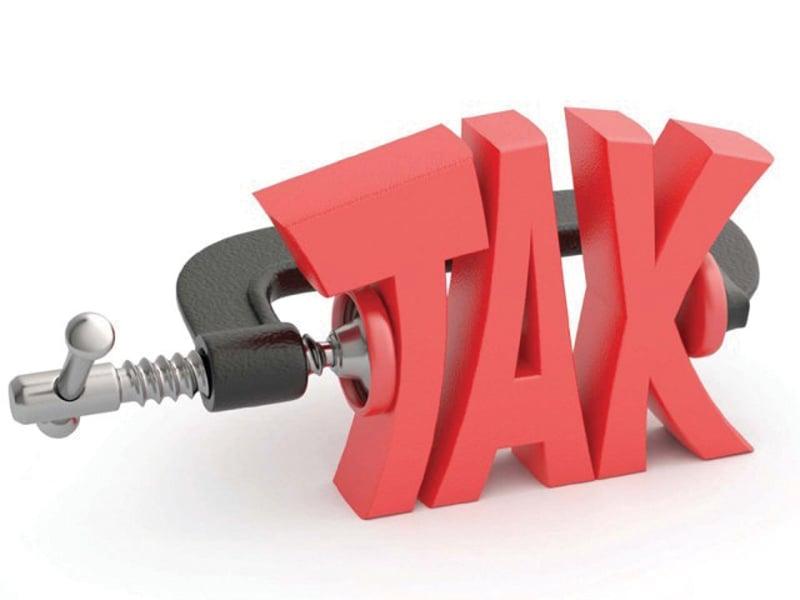ISLAMABAD:
Pakistan failed to meet the International Monetary Fund’s (IMF) condition of collecting over Rs 6 trillion in taxes during the first half of this fiscal year and missed the target by Rs 386 billion.
Despite single-digit nominal growth due to lower than projected inflation, the Federal Board of Revenue (FBR) still recorded a 26% increase in taxes during the July-December period and cannot be blamed for not reaching the goal.
However, the government failed to meet the IMF’s target of collecting at least Rs 23.4 billion from traders from July to December under the Tajir Dost scheme. The tax collection trend shows that the government should ask the IMF to reduce the target instead of accepting any demand for a mini-budget.
Against the target of Rs 6,009 trillion, the FBR provisionally raised Rs 5,623 trillion at the end of December, widening the deficit to Rs 386 billion.
Collection growth was 26% compared to the required pace of 40%. The FBR collected Rs 1.16 trillion more than last year, which was no small feat in an economy that grew less than 1% in the first quarter.
According to sources, the FBR had to resort to massive advances, mainly from the third quarter (January-March) revenue, to get closer to an unrealistic target.
On Monday, the penultimate day, advances of Rs 89 billion were needed, they added. Most of these developments were made in Karachi.
The total collection of Rs 277 billion on the last day of the month, Tuesday, was unparalleled. On the last day, the FBR received Rs 207 billion in income tax alone.
The 26% growth was no less compared to an average inflation of 8%.
But the government’s fiscal measures and erroneous assumptions in setting the annual target of nearly 13 trillion rupees were putting pressure on authorities.
FBR Chairman Rashid Langrial said that despite the fiscal deficit, the department did not block refunds and paid Rs 70 billion in December alone, against Rs 38 billion last year. He said it was the highest refund payment in a month.
In total, the FBR paid Rs 275 billion in refunds during the first quarter of this fiscal year, compared to Rs 234 billion last year.
The president said the tax-to-GDP ratio rose to 10.8% in the first half, which was better than the IMF’s annual target of 10.6%.
The IMF had set the target at Rs 6,009 trillion and said that in case the government missed the target by a margin of 1%, or Rs 61 billion, no additional revenue measures would be necessary. But the gap remained high, exposing authorities to the risk of another budget.
“When the IMF mission arrives, we will talk to them in good faith as we are making all possible efforts to achieve the target,” the Finance Minister said, responding to a question on whether he would bring a mini-Budget or seek reduction in the fiscal objective.
“I am hopeful that the IMF program will continue,” he said, adding that the government was not backing away from any commitments made to the IMF.
The FBR also missed the December fiscal target of Rs 46,000 crore, but the shortfall was much lower than initial estimates.
Prime Minister Shehbaz Sharif said last month that there were trillions of rupees in tax evasion in collusion with tax collectors, but said it would take time before the problems were resolved.
During its unscheduled emergency talks, the IMF last month flagged falling tax revenues as a major area of concern. This came despite the imposition of new taxes worth a record Rp 1.4 trillion, mainly affecting the salaried class and the corporate sector.
The IMF has decided to ask Pakistan to present a mini-budget after analyzing the data from the end of December. The IMF’s view was that direct tax collection was still on track, but there were serious problems in achieving the objectives of three indirect taxes: the sales tax, the federal excise tax, and the customs duty.
The IMF forced the country to impose new taxes, mainly taxing the salaried class, taxing all consumer goods, including medical examinations, stationery, vegetables, infant milk, etc.
For the July-December period, the FBR missed its sales tax, federal excise and customs duty targets, but exceeded the income tax target.
Details showed that income tax collection amounted to Rs 2.78 trillion during the first six months of this fiscal year, up Rs 625 trillion from the previous year. The half-yearly target was Rs 2,524 trillion, which the FBR exceeded by a margin of Rs 256 billion.
Direct taxes are now equivalent to almost half of total revenue, mainly due to new taxes.
Sales tax collection remained at Rp1.9 trillion, Rp384 billion or 25% higher than the previous year.
However, the FBR missed the six-month target by a wide margin of around Rs 179 billion. The target was 2.277 trillion rupees.
The FBR collected Rs 347 billion in federal excise duty, Rs 82 billion more than the previous fiscal year.
The government missed the excise duty target by a wide margin of Rs 107 billion despite doubling the cement tax and imposing tax on lubricating oil and sales of land and buildings in the budget.
The Fed’s target was Rs 454 billion.
Customs duty collection amounted to Rs 598 billion, an increase of Rs 59 billion. The government missed the six-month customs duty target by Rs 156 billion. The target was 754 billion rupees.




